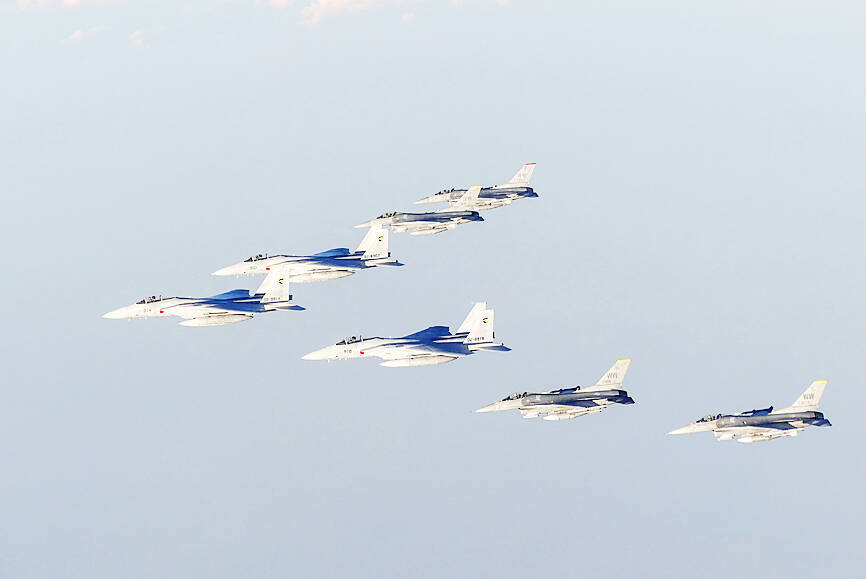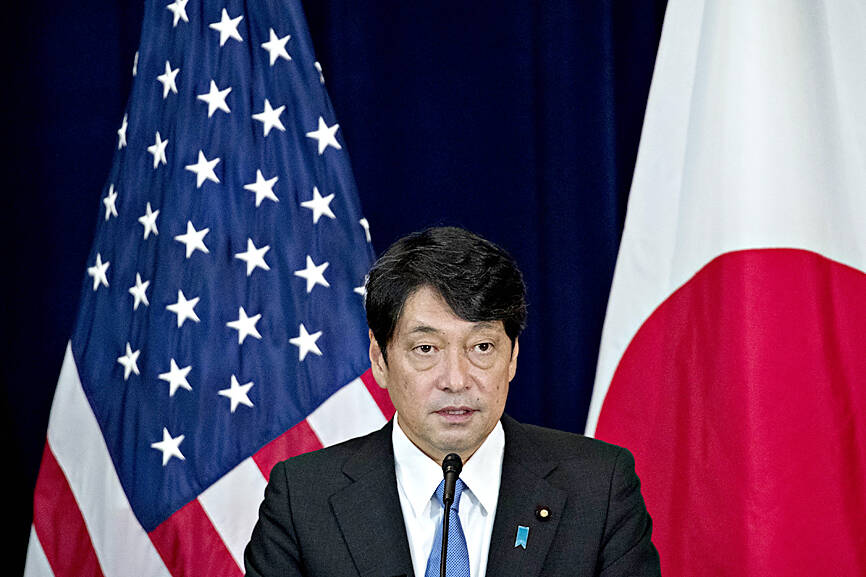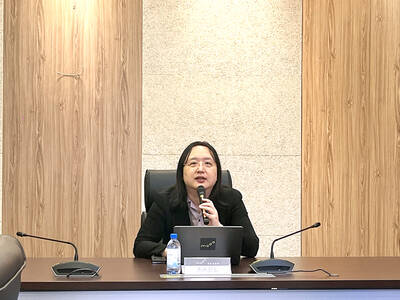Japan’s ruling party is discussing whether to ease military equipment export rules, in part because without a change, the UK would not be able to sell any jet fighters it builds with Japan, former Japanese minister of defense Itsunori Onodera said.
Japan and Britain hope to agree by the end of the year to merge their next-generation Tempest and F-X fighter programs, sources said in July.
Those talks, aimed at a joint project to field a plane in the mid-2030s, remain on track, according to four other people familiar with the discussions.

Photo: AFP / Japan`s Ministry of Defense
“Japan could not oppose exports and neither could we insist that Japanese components be removed, so we are discussing what we can do about that,” said Onodera, chairman of the Liberal Democratic Party’s (LDP) Research Commission on National Security.
Japan ended a ban on military exports in 2014 in a bid to promote overseas sales. It hoped the change would allow its armed forces to cut procurement costs and give domestic military equipment makers such as Mitsubishi Heavy Industries Ltd access to foreign markets that would boost profits and bolster the nation’s defense industry.
However, an export boom failed to materialize because Japan only allowed sales of nonlethal gear such as surveillance and rescue equipment.

Photo: Bloomberg
“If we are going to sell beyond the countries we jointly develop with, we will need to settle the discussion at home,” Onodera said.
The influential lawmaker spoke as Japan prepares to increase defense spending and revamp its national security strategy to counter what it sees as a growing threat posed by China, Russia and North Korea.
As part of its biggest military expansion since World War II, Japan is expected to procure fresh munitions, including longer-range missiles, spend on cyberdefenses and create a combined air, sea and land command headquarters that would work more closely with US forces in Japan.
LDP lawmakers are also discussing a joint US-Japan command structure that could be formed for national emergencies, Onodera said.
“In order to defend Japan, we would be working with the United States to deploy units, so it’s only natural that we would want to discuss having a combined command,” he said.

SELF-SUFFICIENCY: The project would only be the beginning, as Taiwan needs at least 120 satellites to ensure uninterrupted communication, Wu Tsung-tsong said The Taiwan Space Agency (TASA) yesterday said it plans to launch six low Earth orbit satellites starting in 2026 as part of the government’s plan to boost the resilience of the nation’s communications. The development of the technology gained attention after Ukrainians were able to access the Internet through Space Exploration Technologies Corp (SpaceX) CEO Elon Musk’s Starlink satellite service, despite their infrastructure being severely damaged in the war with Russia. Two of the satellites would be built by the government, while four would involve cooperation between TASA and private contractors. “Over the past 30 years, the satellite technology in Taiwan has

PLAN: Nations would receive US$5m a year if they could advance Taiwan’s international participation, diversify supply chains away from China or counter Beijing’s influence The US House of Representatives Select Committee on Strategic Competition Between the US and the Chinese Communist Party (CCP) on Friday introduced a bill that would approve US$120 million to be spent on supporting Taiwan’s international space and tackling coercion by China. The bipartisan legislation — the Taiwan Allies Fund Act — was proposed ahead of the inauguration of president-elect William Lai (賴清德) of the Democratic Progressive Party (DPP) on May 20. The committee said in a statement that the bill “strengthens Taiwan’s global network of friends by authorizing [US]$120 million over three years for the State Department and USAID [US Agency

‘MONEY PIT’: The KMT’s more than NT$2 trillion infrastructure project proposals for eastern Taiwan lack professional input and financial transparency, the DPP said The Democratic Progressive Party (DPP) caucus yesterday said it would ask the Executive Yuan to raise a motion to oppose the Chinese Nationalist Party (KMT) caucus’ infrastructure proposals and prepare to file for a constitutional interpretation if the KMT-dominated legislature forces their passage. The DPP caucus described the three infrastructure plans for transportation links to eastern Taiwan proposed by the KMT as “three money pit projects” that would cost more than NT$2 trillion (US$61.72 billion). It would ask the Executive Yuan to oppose public projects that would drain state financial resources, DPP caucus secretary-general Rosalia Wu (吳思瑤) said. It would also file for

POSSIBLE SOLUTION: The government needs to convey regulations to advertising platforms based overseas and access to the offenders could be restricted, Minister said The government is considering asking TikTok and other large digital advertising platforms to have agents based in Taiwan in accordance with the draft act on the prevention and control of fraud and crime, which is scheduled to be reviewed at an Executive Yuan meeting today, the Ministry of Digital Affairs said yesterday. The draft act is one of the legislative measures being introduced by the government to tackle scams, including the draft technology investigation and security act, and amendments to the Money Laundering Control Act (洗錢防制法) and the Communication Security and Surveillance Act (通訊保障及監察法). They are also to be reviewed